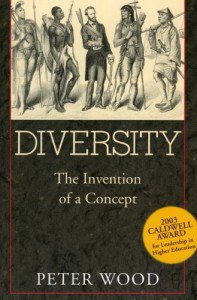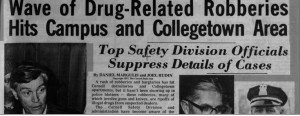


03/07/2016
There have been some later developments in the storm-in-an-academic-teacup over Williams College President Adam Falk canceling a talk I was invited to give to the “Uncomfortable Learning” student group.
The National Association of Scholars  (of which I am a member) has been on the case. NAS is, to quote
(of which I am a member) has been on the case. NAS is, to quote
their mission statement, “a network of scholars and citizens united by our commitment to academic freedom, disinterested scholarship, and excellence in American higher education.”
Anthropologist Peter Wood, the President of NAS, has posted a long (4,400 words) account of some exchanges he’s had with President Falk, embellished with Dr. Wood’s own commentaries.
The piece defies compression, though I shall pull out some quotes below. If you are interested in academic freedom in general, and the stifling power of the Antiracism cult in particular, I urge you to read the whole thing.

I should say that I have some slight personal acquaintance with Dr. Wood. Some years ago I reviewed his book Diversity: The Invention of a Concept. My review was for the most part favorable. I only added some gentle chiding towards the end:
For all its delights, this is a flawed book, with a hole at its center. Peter Wood is an inhabitant of the Respectable Right, and so is scrupulously deferential to what William F. Buckley, Jr., the leading light of this faction, has called “the prevailing structure of taboos.” This book began, in fact, as an essay posted on the National Review Online website. As one so often finds these days with books that seek to challenge current sociological pieties while staying within the bounds of acceptable comment — bounds drawn and vigilantly patrolled by left-liberal opinion elites — this approach weakens Peter Wood’s case. Why, after all, is the diversity racket so persistent? Intelligent people everywhere scoff at it and constantly make jokes about it. Even TV sitcoms do so. A recent episode of Fox TV’s Andy Richter Show revolved around a workplace diversity wrangle, and had characters uttering lines like: “So I am supposed to celebrate your difference while at the same time totally ignoring it, right?” (I note, however, that this show seems to have been canceled.) Why, when wellnigh everybody — including, very likely, some large subset of the diversicrats themselves — knows that it is all nonsense, do we let it go on?We all know the answer …
[E pluribus plurimum by John Derbyshire; The New Criterion, March 2003.]
Of course we do.
Since then I have met Dr. Wood at academic gatherings, and he seems to harbor no hard feelings. At our last contact, a few weeks ago, relations were perfectly cordial.
To Dr. Wood’s March 1st piece at Nas.org: He focuses on the “line” that President Falk claimed to have found in the February 18th email announcing the cancellation of my talk. From President Falk’s email:
We have said we wouldn’t cancel speakers or prevent the expression of views except in the most extreme circumstances. In other words: There’s a line somewhere, but in our history of hosting events and speeches of all kinds, we hadn’t yet found it.We’ve found the line. Derbyshire, in my opinion, is on the other side of it. Many of his expressions clearly constitute hate speech, and we will not promote such speech on this campus or in our community. [John Derbyshire’s Scheduled Appearance at Williams by Adam Falk; February 18, 2016.]
Dr. Wood tells us:
When I wrote to President Falk I explained:I do not write as a defender of Mr. Derbyshire’s views. Rather, I write as the head of an organization that is deeply interested in — to use your phrase — where “the line” should be drawn between permissible free speech on campus and impermissible forms of expression.
[A Guide to Disinvitation: My Conversation with Williams College President Adam Falk by Peter Wood; nas.org, March 1, 2016.]
His attempt to get some clarification on this point was unsuccessful.
President Falk’s answer does not really address the question of where and how he draws the line.
Later in his post Dr. Wood tells us where he would draw the line:
I have a few suggestions for where such a line might be drawn. Among those who should not be invited or, if invited should be disinvited, include:It is certainly imaginable that even in these cases students could benefit from a first-hand encounter with such speakers, but in these instances the college has a higher responsibility to the rule of law.
- Advocates of criminal violence
- Spokesmen for or advocates of nations or movements engaged in armed hostility with the United States
- Figures who are fugitives from the law of the United States
- Figures publicly identified as leaders of organized crime
That seems to me very sensible, far too sensible for a hysterical ninny like President Falk.
If you are detecting a certain detached indifference on my side of this, your detector’s working fine. I really can’t engage with people like Falk, who speak — and apparently think — in the cant words and phrases of a shallow ideology.
In one of his responses to Dr. Wood, for example, Falk writes:
As for Derbyshire’s views on white supremacy, I would point you to the following passage that appeared on the website VDare:Leaving aside the intended malice, I actually think “White Supremacist” is not bad semantically. White supremacy, in the sense of a society in which key decisions are made by white Europeans, is one of the better arrangements History has come up with. There have of course been some blots on the record, but I don’t see how it can be denied that net-net, white Europeans have made a better job of running fair and stable societies than has any other group.
Frankly, this is the kind of material I would expect to see distributed by organizations such as the Ku Klux Klan.
Leaving aside President Falk’s utter, obvious lack of any sense of proportion (has he ever read any Ku Klux Klan literature?), just ponder briefly those three sentences of mine that he quotes.
My latter two sentences make an assertion about the human world by way of parsing the cant phrase “White Supremacy.”
Here is how my thinking goes when I am presented with statements of this sort.
First question: Is the assertion true, or is it false?
If it’s true, as in this case it obviously is, there is no more to be said. If it’s false, we advance to …
Second question: Is the writer honestly mistaken, or has he knowingly written a falsehood?
The default charitable assumption should be that he’s honestly mistaken. Then you should try to correct him, if only in your own mind as a reader.
If, however, you have reason to think he has knowingly committed a falsehood to paper or pixels, we advance to …
Third question: Was the falsehood committed with a good intent, or a bad one? (It is of course possibly to lie with good intent. I doubt it is possible to raise children without doing so.)
Those, it seems to me, are the thought processes of a rational person evaluating written assertions about the world. We apply our own judgment, knowledge, and experience, and work through the questions.
President Falk’s thought processes are nothing like that. They operate in a different realm, one that seems strange — alien — to me.
What they are like is the mentality of a witch-hunter or KGB interrogator, rooting out thoughtcrime. Aha! — so you favor White Supremacy! Confess!
The truth or falsehood of the printed statements is of no interest to such a mentality. What is interesting is Bad Thoughts, and the tagging of them with the approved cant word or phrase.
*
There may be something else going on here, too: fear. Most academics are timid, highly-strung types who cherish the hope of tenure (if they haven’t got it) or a quiet life (if they have).
Dr. Wood touches on this:
I don’t know the situation at Williams first hand. I’ve visited the college half a dozen times over the years. My nephew is a graduate, and I attended his graduation some years ago. More recently I was an invited speaker at Williams after the NAS published What Does Bowdoin Teach? How a Contemporary Liberal Arts College Shapes Students. [PDF] And I have had some contact with current Williams students and faculty members. But from what I do know, I would venture the guess that President Falk is apprehensive about the possibility of strong campus protest rooted in racial grievance. Perhaps he foresaw something like what happened at California State University, Los Angeles on February 25, when student protesters violently disrupted Breitbart news editor Ben Shapiro’s talk on “When Diversity Becomes a Problem.”Many elite colleges have been roiled by such protest in recent months, including nearby Dartmouth. And Williams itself has a history in recent years of racial grievance protests. In at least one case, many Williams students believed the precipitating incident was staged — another one of those “hoax crimes” that are epidemic on college campuses.
That chimes with things I myself have heard from inside the academy. Most of those I have heard it from are of course (of course!) afraid to speak publicly.

Not all, though. Following the cancellation of my Williams talk I had some email exchanges with a wise man who has had decades of experience teaching in colleges. This is my friend Bob Weissberg, former professor of political science, and author of the excellent book Bad Students, Not Bad Schools (reviewed by Steve Sailer here).
Now retired, Bob has given permission for me to quote his comments. Here they are, slightly edited:
Having been in the academy for nearly forty years, this doesn’t surprise me. It’s hardly new.I began my teaching career at Cornell University in 1969 and saw similar anti-free speech events back then. Let me suggest the unspeakable motivating factor: fear of violence, particularly from black thugs.
The University and its faculty is virtually defenseless against such violence for the simple reason that those attacked will not fight back. They will instead apologize and call for “dialogue.” The thugs sense that and are emboldened.
I can recall Walter Berns, a distinguished professor of constitutional law, hiding in a cheap motel under an assumed name. Such is the life of the mind.
On today’s campus, being a macho male is an automatic disqualification for faculty position. Such traits will be judged intimidating. This is far less true for the thugs — for them, being violent is a sign of authenticity. That almost no male faculty member ever served in the military is also a factor.
Cornell during the late 1960s was ground zero in the “blackening” of the campus via thuggery. Ithaca had a small and well socialized black population left over from the Civil War era. For the people who ran Cornell, these were typical blacks. They had no contact with the “New Men” of the Revolution.
When I was there I heard stories of random anti-white violence — blacks just showing up at a campus gym and seriously injuring a white in the wrong place at the wrong time. The random nature of the violence made it especially terrifying. There could be no escape. [Wave of Drug-Related Robberies Hits Campus and Collegetown Area | Top Safety Division Officials Suppress Details of Cases, By Daniel Margulis And Joel Rudin, Cornell Daily Sun, November 21, 1972]

The whole affirmative action enterprise was corrupt. The black head of the program — Delridge Hunter — stole lots of money and was caught. He agreed to resign only after Cornell agreed not to prosecute him for the theft and write a letter of recommendation on his behalf. Black students were issued Cornell credit cards for their book purchases and instead they spent the money on knick-knacks or clothing. [See "Colleges are Skipping Over Competent Blacks to Admit 'Authentic' Ghetto Types," New York Times Magazine, By Thomas Sowell, December 13, 1970]
Almost a half century has passed since then and we have learned nothing, or at least nothing we can say in public.
Racial PC, at least in political science, has a long history. I can recall it during my graduate student days in the mid-1960s. There were very few blacks in the profession back then and no school had a Director of Diversity and all that, but the party line was reasonably clear. One just did not say anything “hateful” about blacks, particularly their cognitive capacities.
For example, if a city government run by blacks was a disaster, the official explanation was that the “white downtown business interests” were responsible for the city’s decline …
Dr. Wood’s careful remarks, and Bob’s more straightforward ones, touch on what is perhaps the greatest, the most unmentionable, of all the many Unmentionables about race in America: that whites, in the generality, are scared of blacks, in the generality.
It is very unusual to hear any acknowledgment of this fact from native-born Americans, but foreigners are more forthright. (One of the benefits of immigration?)
Hungarian-born historian, Holocaust survivor, and self-described reactionary John Lukacs, for example. Lukacs came to the U.S.A. in the 1940s.

In one of the sketches in his 1998 book A Thread of Years, Lukacs reports a conversation with the wife of a "middle-upper-class" New York stockbroker who has left the city to live in rural Maine.
Why (asks the narrator)? Was he mugged? No, says the wife (the narrator tells us), he was not mugged …
…though he witnessed something like a mugging. It happened in broad daylight, at a shining noon hour in mid-town Manhattan, on Forty-Fifth Street, between Madison and Park. A black deliveryman and a white deliveryman were fighting on the pavement while shouting obscenities. People watched. Another black climbed down from a truck. Together they kicked and pummeled the white one; in the end they pushed him down to the pavement, laughed and spat at him, then jumped into the truck and drove away. No one stopped them. He wanted to stop them (he had been in the Navy), but his wife screamed and held him back. What upset him was not the brutality and ugliness of the scene. He suddenly realized that whites are now afraid of blacks. That hit him in the craw —"That this was racism in the reverse, because in the past blacks used to be afraid of whites?"
This was something new. Blacks are a minority, just as Jews were a minority in Germany, but were there any Nazis afraid of Jews? And there was this in his mind too: that somehow these white people in New York were hopeless because they were responsible for what was happening, though not only because of the former mistreatment of blacks by white Americans. They were responsible because of their own acceptance of the cult of brutality and of ugliness. The law of the jungle had broken to the surface here, in midtown Manhattan, and the people there were not up to it. [A Thread of Years by John Lukacs (1998), pp. 466-467.]
*
Dr. Wood says of me, clutching at his Respectable Right pearls:
He publishes on a very marginal website called VDARE (named for Virginia Dare, the first white born in North America), and he lives, by his own account, “entirely, and somewhat precariously, by the pen.” Disinviting him was unlikely to unleash storms of protests from outraged conservatives.

"Conservative" here, of course, means Conservatism Inc. or "cuckservative." Dr. Wood is right about that!
But Virginia Dare was not "the first white child born in North America." I am surprised, and somewhat dismayed, to find an accredited academic — an anthropologist, yet! — making such a common error. The first white child born in North America was Snorri Thorfinnsson. Virginia Dare was the first child of English parentage born in North America.
VDARE.com may be "very marginal" compared to Williams College — although it had 1.2 million page views this month and did predict the rise of Trump, unlike the MSM. That does not mean, as Dr. Woods should know better than anyone, that it is wrong.
John Derbyshire writes an incredible amount on all sorts of subjects for all kinds of outlets. (This no longer includes National Review, whose editors had some kind of tantrum and fired him. ) He is the author of We Are Doomed: Reclaiming Conservative Pessimism and several other books. He’s had two books published by VDARE.com: FROM THE DISSIDENT RIGHT (also available in Kindle) and From the Dissident Right II: Essays 2013. His writings are archived at JohnDerbyshire.com.
Readers who wish to donate (tax deductible) funds specifically earmarked for John Derbyshire’s writings at VDARE.com can do so here.